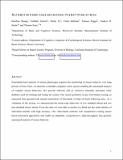| dc.contributor.author | Jhuang, Huei-Han | |
| dc.contributor.author | Garrote, Estibaliz | |
| dc.contributor.author | Yu, Xinlin | |
| dc.contributor.author | Khilnani, Vinita | |
| dc.contributor.author | Poggio, Tomaso A. | |
| dc.contributor.author | Steele, Andrew D. | |
| dc.contributor.author | Serre, Thomas R. | |
| dc.date.accessioned | 2011-06-20T14:10:50Z | |
| dc.date.available | 2011-06-20T14:10:50Z | |
| dc.date.issued | 2010-01 | |
| dc.identifier.issn | 2041-1723 | |
| dc.identifier.uri | http://hdl.handle.net/1721.1/64492 | |
| dc.description.abstract | Neurobehavioral analysis of mouse phenotypes requires the monitoring of mouse behavior over long
periods of time. Here, we describe a trainable computer vision system enabling the automated analysis
of complex mouse behaviors. We provide software and an extensive manually annotated video
database used for training and testing the system. Our system performs on par with human scoring, as
measured from ground-truth manual annotations of thousands of clips of freely behaving mice. As a
validation of the system, we characterized the home-cage behaviors of two standard inbred and two
non-standard mouse strains. From this data we were able to predict in a blind test the strain identity of
individual animals with high accuracy. Our video-based software will complement existing sensor
based automated approaches and enable an adaptable, comprehensive, high-throughput, fine-grained,
automated analysis of mouse behavior. | en_US |
| dc.description.sponsorship | McGovern Institute for Brain Research | en_US |
| dc.description.sponsorship | California Institute of Technology. Broad Fellows Program in Brain Circuitry | en_US |
| dc.description.sponsorship | National Science Council (China) (TMS-094-1-A032) | en_US |
| dc.language.iso | en_US | |
| dc.publisher | Nature Publishing Group | en_US |
| dc.relation.isversionof | http://dx.doi.org/10.1038/ncomms1064 | en_US |
| dc.rights | Creative Commons Attribution-Noncommercial-Share Alike 3.0 | en_US |
| dc.rights.uri | http://creativecommons.org/licenses/by-nc-sa/3.0/ | en_US |
| dc.source | Prof. Poggio via Lisa Horowitz | en_US |
| dc.title | Automated Home-Cage Behavioural Phenotyping of Mice | en_US |
| dc.type | Article | en_US |
| dc.identifier.citation | Jhuang, Hueihan et al. “Automated Home-cage Behavioural Phenotyping of Mice.” Nat Commun 1 (2010) : 68. | en_US |
| dc.contributor.department | Massachusetts Institute of Technology. Department of Brain and Cognitive Sciences | en_US |
| dc.contributor.approver | Poggio, Tomaso A. | |
| dc.contributor.mitauthor | Jhuang, Huei-Han | |
| dc.contributor.mitauthor | Garrote, Estibaliz | |
| dc.contributor.mitauthor | Poggio, Tomaso A. | |
| dc.contributor.mitauthor | Serre, Thomas R. | |
| dc.relation.journal | Nature Communications | en_US |
| dc.eprint.version | Author's final manuscript | en_US |
| dc.type.uri | http://purl.org/eprint/type/JournalArticle | en_US |
| eprint.status | http://purl.org/eprint/status/PeerReviewed | en_US |
| dspace.orderedauthors | Jhuang, Hueihan; Garrote, Estibaliz; Yu, Xinlin; Khilnani, Vinita; Poggio, Tomaso; Steele, Andrew D.; Serre, Thomas | en |
| dc.identifier.orcid | https://orcid.org/0000-0002-3944-0455 | |
| mit.license | OPEN_ACCESS_POLICY | en_US |
| mit.metadata.status | Complete | |
